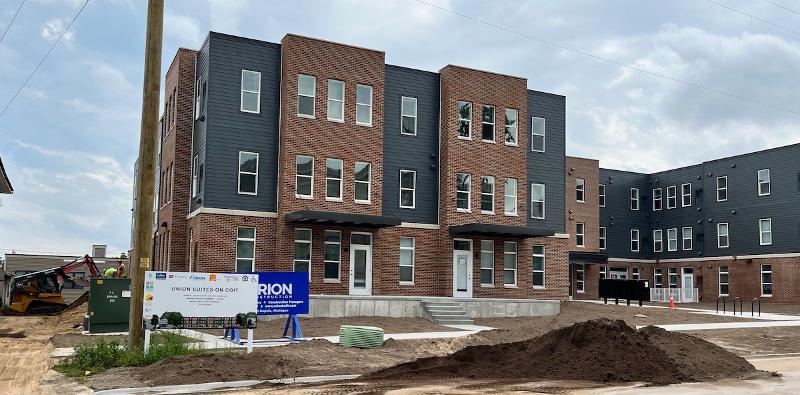The Michigan State Housing Development Authority board has approved innovative subsidy programs to tackle the affordable housing crisis. The Housing Tax Increment Financing program and Pilot Housing TIF Gap Lending program will transform underutilized properties into quality, affordable housing, spurring economic activity and aiding environmental protection. With these exciting developments, Michigan will witness an increase in the housing supply, benefiting residents who need affordable homes the most.
Revitalizing Communities with the Housing TIF Program
Discover how the Housing Tax Increment Financing program is transforming underutilized properties into quality, affordable housing, spearheading economic activity, and aiding environmental protection.
The Housing TIF program, introduced under the Michigan State Housing Development Authority board, is set to revolutionize the redevelopment of blighted properties. This program allows tax revenues from local brownfield redevelopment authorities to fund housing development activities. With funds dedicated to creating affordable housing, underutilized properties can now be revolutionized, becoming havens of new opportunities.
Qualified rehabilitation reimbursements, upgrading public infrastructure for safety, demolishing and renovating existing buildings for income-qualified households, and financing gaps for the development of units — these are just some of the eligible housing development activities under the Housing TIF program. By utilizing this program, developers and communities will breathe new life into discarded properties, ensuring the housing supply meets the demands of those who need it most in the ever-changing housing market.
Beyond the life-enhancing benefits for individuals and families, this newly approved program also focuses on spearheading economic growth. With the injection of new housing projects and renovations, jobs are created in construction, local economies flourish, and residents are provided with more opportunities to thrive. The long-awaited expansion of the brownfield law indefinitely opens doors by integrating the scope of brownfield redevelopment from mainly commercial and industrial uses to now encompassing affordable housing.
Pilot Housing TIF Gap Lending Program: Bridging the Financing Gap
Learn how the Pilot Housing TIF Gap Lending program is facilitating construction loans and permanent tax reimbursement loans to address the financing gap in affordable housing development projects.
Recognizing the financing challenges that developers face in creating affordable housing, the Michigan State Housing Development Authority board has given the green light to the Pilot Housing TIF Gap Lending program. This groundbreaking initiative paves the way for state funding to be offered to developers in the form of construction loans and permanent tax reimbursement loans.
By providing financial assistance, developers can surmount the hurdles in securing adequate funding to bridge the gap between project costs and available resources. Housing projects subject to income restrictions bear the fruits of this program, bolstering the creation of affordable homes for individuals and families across Michigan. This financial backing enhances developers' confidence to initiate and sustain sustainable, affordable housing development, ensuring projects will proceed smoothly from breaking ground to completion.
The implementation of the Program opens up new possibilities for creating much-needed affordable housing stock, aiding low- and middle-income households in becoming homeowners or gaining access to affordable rental opportunities. Michigan's communities stand to benefit from the dedicated commitment to robust housing project-based financing, promoting a stable and prosperous future for Michiganders statewide.
Conclusion
The approval of the Housing Tax Increment Financing program and the Pilot Housing TIF Gap Lending program by the Michigan State Housing Development Authority board marks a significant milestone in addressing the affordable housing challenges in the state. These programs provide crucial financial support and incentives for developers to create and preserve affordable housing stock.
With the implementation of these innovative initiatives, underutilized properties will be revitalized, transforming into quality and affordable housing options for Michigan residents. The creation of more affordable homes not only positively impacts individuals and families but also drives economic growth and environmental protection efforts.
Michigan is making great strides in ensuring that affordable housing remains a top priority. The collaboration between government agencies, nonprofits, and advocacy organizations demonstrates an unwavering commitment to meet the housing needs of individuals and families across the state.
FQA
How will the Housing TIF program benefit Michigan communities?
The Housing TIF program is set to revitalize blighted properties, transforming them into quality, affordable housing options. With the program's focus on redevelopment and funding for housing development activities, communities will witness increased economic activity, environmental protection, and an enhanced housing supply for Michigan residents.
What types of housing development activities are eligible under the Housing TIF program?
The Housing TIF program covers a wide range of activities, including reimbursing owners for rehabilitation, upgrading public infrastructure, demolishing and renovating existing buildings, filling financing gaps for affordable units, and covering relocation costs for income-qualified households. It provides developers with the necessary resources to overcome barriers in creating affordable housing.
How does the Pilot Housing TIF Gap Lending program address financing challenges in affordable housing development?
The Pilot Housing TIF Gap Lending program offers financial assistance to developers through construction loans and permanent tax reimbursement loans. This program bridges the financing gap that developers face, enabling them to secure adequate funding for their affordable housing projects. This support ensures the smooth progression of affordable housing developments and increases the availability of affordable homes for Michiganders.

